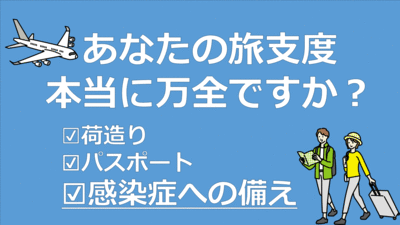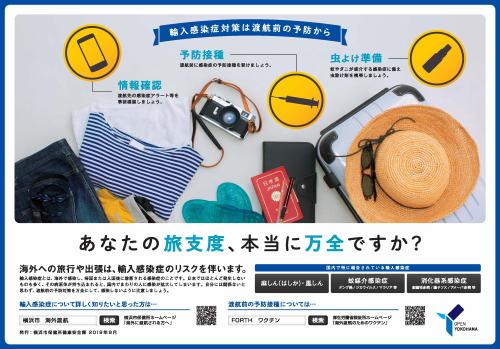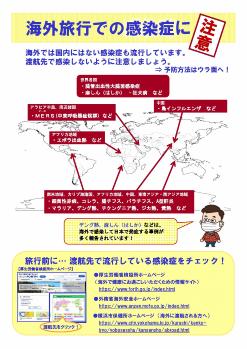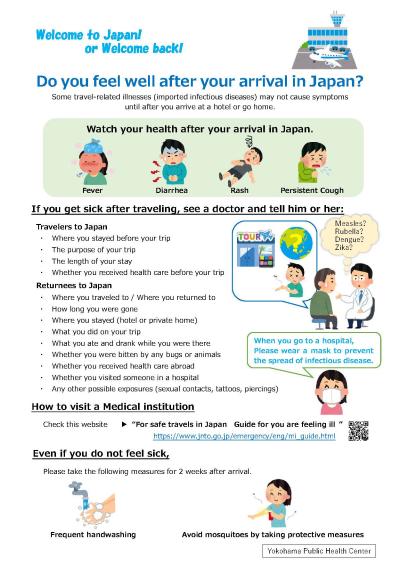- Yokohama-shi Top Page
- Health, Medical and Welfare
- Health and Medical Care
- Vaccinations Infectious Diseases
- Infectious diseases
- For those who are traveling abroad
Here's the text.
For those who are traveling abroad
Last Updated October 16, 2024
About infectious diseases that should be noted when traveling abroad

There are various infectious diseases that are rarely seen or are not well known in Japan, and that are at high risk of infection overseas.
Restrictions on travel abroad have been relaxed, and traffic with and from overseas has become more active. As a result, it is expected that the number of people suffering from infectious diseases that are prevalent overseas will increase.
Before traveling abroad, acquire the correct knowledge in advance about how to prevent infectious diseases and the status of outbreaks in each region, and have a safe and enjoyable time.
For more information about infectious diseases that are prevalent overseas, see About Import Infectious Diseases.
Watch out for infectious diseases and enjoy traveling abroad videos
 Imported Infectious Disease Countermeasure Poster
Imported Infectious Disease Countermeasure Poster
 Imported Infectious Disease Prevention Awareness Flyer
Imported Infectious Disease Prevention Awareness Flyer
- Poster "Is your trip ready really perfect?" (PDF: 584KB)
- Flyer "Beware of infectious diseases when traveling abroad" (PDF: 792KB)
Please print it out freely and use it.
1.Before traveling…
Before departure, be sure to stay in good condition and stay resistant.
In addition, it is very important to obtain information on the hygiene status of the destination, the epidemic status of infectious diseases, and medical institutions in advance. Please refer to the following website for infectious diseases to be aware of.
- Quarantine Station, Ministry of Health, Labour and Welfare FORTH (Infectious Disease Information for Overseas Travelers) Homepage (External Site)
- Quarantine Station, Ministry of Health, Labour and Welfare FORTH>Valuable Information>Be careful here! Overseas Travel (outside site)
- Ministry of Foreign Affairs Overseas Safety Website (outside site)
- Ministry of Foreign Affairs website>Overseas Travel and Stay>Medical conditions around the world (outside site)
- National Institute of Infectious Diseases website>Information on infectious diseases to be searched by disease name (outside site)
Some infectious diseases (yellow fever (outside site), measles, wind shin, etc.) can be prevented by Vaccinations. Consider vaccination according to your destination area, travel period, and activities during your trip.
2.General precautions when traveling abroad
There are various infectious diseases that may occur depending on the behavior at the destination, but general precautions are as follows.
The most common is food and water-borne digestive infections. There are enterohemorrhagic Escherichia coli (such as O157), hepatitis A, cholera, bacterial dysentery, typhoid and parachiphus.
- Avoid raw water, boil the water and drink mineral water. Be careful of juice with ice or water-filled sake.
- Avoid raw vegetables, cut fruits, raw seafood and meat.
- Avoid freshly squeezed milk, ice cream, yogurt, etc.
There are many diseases transmitted by mosquito bites, such as yellow fever, malaria, dengue fever, Zika virus infection, West Nile fever, and Chikungunya fever. Care must be taken especially in tropical and subtropical regions. It is also necessary to pay attention to fleas and ticks.
- Wear long sleeves and long pants to avoid exposing your skin.
- Use insect repellent sprays and mosquito coils.
- When you go to bed, use a kaya or the like.
For more information, please visit this page. → "About mosquito-borne infectious diseases"
Dogs, monkeys, rodents (such as rats) and birds can have a variety of pathogens, such as rabies and bird flu.
- Do not approach or touch animals unnecessarily.
There may be parasites on watersides such as rivers, lakes, and swamps.
- Avoid walking barefoot or entering the water in endemic areas.
By touching the mouth, nose, eyes, etc. with a hand with a pathogen, the pathogen enters the body.
- Let's wash your hands frequently. In particular, hand washing before eating and after the toilet is important.
3.After returning to Japan…
Quarantine stations at airports and ports provide health consultations. If you are unwell at the time of entry, please be sure to consult us.
Also, depending on the infectious disease, you may get sick after a while, even if there is no problem when you return home.
In that case, please inform us in advance of your destination, length of stay, contact with animals, etc., and perform sufficient cough etiquette (wearing a mask, etc.) and consult a medical institution.
- Going back from the trip, "What's wrong? -“Health Check after Travel” (Ministry of Health, Labour and Welfare Quarantine Station) (outside site)
- Quarantine Station, Ministry of Health, Labour and Welfare FORTH (Infectious Disease Information for Overseas Travelers) Homepage>Quarantine stations nationwide (outside sites)

Infectious disease awareness leaflets for immigration and returnees
You may need a separate PDF reader to open a PDF file.
If you do not have it, you can download it free of charge from Adobe.
![]() To download Adobe Acrobat Reader DC
To download Adobe Acrobat Reader DC
Inquiries to this page
Health and Safety Division, Medical Care Bureau Health and Safety Department
Telephone: 045-671-2463
Telephone: 045-671-2463
Fax: 045-664-7296
Email address: ir-kenkoanzen@city.yokohama.jp
Page ID: 952-277-273







